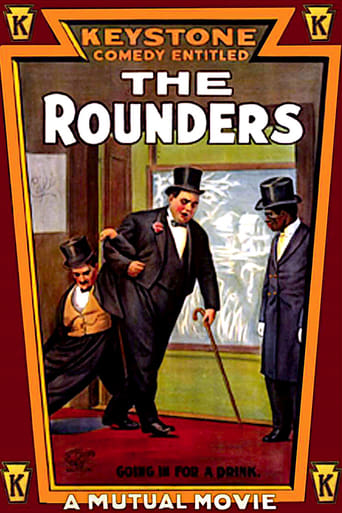Michael_Elliott
The Rounders (1914) *** (out of 4) Charlie Chaplin and Roscoe 'Fatty' Arbuckle show up separately at their homes where they take a beating from their wives. The two eventually bump into one another in more way than one and decide to go out together but of course the nagging wives follow. THE ROUNDERS is far from a classic movie and the truth is that's it's barely even a good one. With that said, it's impossible not to at least enjoy seeing the two comic legends working together and both of them delivering nice performances. As far as the comedy goes, it's very hit and miss because the majority of the times we're just getting the same gags over and over. The two drunks stumble around, knock things over and they each get hit a lot. This pretty much happens throughout the entire running time and their drunk level seems to change from one scene to the next. I still thought Chaplin and Arbuckle had some fine chemistry working together and this is show during the scenes where the two are trying to hold each other up and walk at the same time. This is certainly far from their best work but it's still worth watching.
CitizenCaine
Chaplin again teams up with Fatty Arbuckle as drunks who argue with their wives in separate hotel rooms. The two comedians play drunks as well as anyone before or since. Minta Durfee, Fatty's real life wife at the time, plays his wife here. The spouses go at it quite a bit before Charlie checks out the commotion next door to find Fatty in the same situation he's in. Charlie and Fatty become fast friends and steal away to the hotel's restaurant while the wives argue with each other. Once in the restaurant, sight gags follow and then the wives. In minutes the whole restaurant is up in arms and Charlie and Fatty run off to get away stealing a boat in the process. The ending is grand. Look closely for Charley Chase in the restaurant. ** of 4 stars.
Alonzo Church
Most Keystones do not age well. Comedy tastes have changed over 90 years, and the hyper-speed frantic randomness of the early Keystones tend to leave the viewer wondering what was supposed to be funny. And frequently, plots are both too complicated and stereotyped.This one is different. There ain't no plot. All that happens is that Chaplin and Arbuckle, roaringly drunk, annoy their wives, patrons of a restaurant, and eventually the entire civilized world (which seems to have found its way to Griffith Park in LA.) Charlie Chapin and Fatty Arbuckle are very, very funny drunks. They just have the routine down. Chaplin's drunken behavior around his wife is hilarious, because he knows how to make inanimate objects do all the wrong things, and he knows how to pitch his body in all sorts of wrong angles. Arbuckle is not the comedian that Chaplin is, but he keeps up, particularly when he and Chaplin start to demolish a posh restaurant.The key to this short is pacing. Chaplin and Arbuckle do not spaz out in the typical Keystone way, to assure everyone what hysterical fellows they are. They just move according to their own looped logic, and let the application of that logic be the humor.The ending, by the way, can be taken as a bit of a cosmic statement -- and is that rare thing in a short comedy -- the perfect closing gag.
Snow Leopard
It's fun to see Roscoe Arbuckle and Charlie Chaplin together (plus a couple of brief appearances by Al St. John), although this movie as a whole is only mildly entertaining. Not that either of the stars disappoints, by any means, but the material limits them somewhat. It's also interesting, though, to see an earlier version of the extended, more carefully planned "drunk" acts that Chaplin did in features like "The Cure" and the excellent "One A.M."The story is episodic, with the two stars as a couple of good-natured drunks who get into trouble with their wives and with plenty of others. Chaplin and Arbuckle could do that kind of material as well as anyone. Most of it is funny enough, although after a while it starts to run out of steam and seem a bit forced. There are a couple of good gags to go along with their drunk act, though other parts are fairly routine stuff. It's probably a little above average for its time, but it's not as imaginative as either Arbuckle's or Chaplin's best material.


